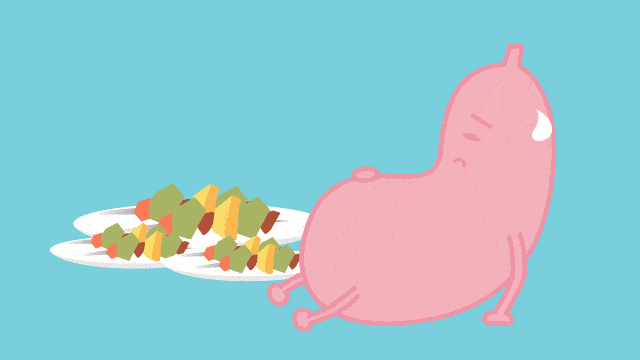
Some people will feel “struck” in their stomachs even if they haven’t eaten, and they often want to hiccup or “gas out”… they may be experiencing “flatulence”.
Everyone has gas in the gastrointestinal tract, but when there is a difference between the amount of gas that enters the body and the amount of gas discharged, it may increase the amount of gas accumulation and make people more and more “expand”.

The seemingly ordinary flatulence is not only uncomfortable or embarrassing, but some may also be signs of disease.
5 habits that make you “expand” gradually
Flatulence in the stomach not only causes abdominal pain, frequent farting, and hiccups, but also impairs the vitality of internal organs. If abdominal distension is not taken seriously for a long time, it may decrease gastrointestinal function and cause digestive system diseases.

The following are the causes of flatulence:
Eat foods that are prone to gas
Cruciferous vegetables. The complex sugars contained in broccoli, cabbage and cabbage (which can be fermented by intestinal bacteria) are in an undigested state before fermentation and are prone to produce gas.
Beans. Legumes such as lentils, soybeans, and peas are rich in protein, but they also contain sugar and fiber that the human body cannot absorb, which can easily cause flatulence.
Dairy products. Feeling flatulence after eating cheese or drinking milk may be caused by lactose intolerance.
Apple. Apples contain fructose and sorbitol, which many people cannot tolerate. If you eat too much, you will have abdominal bloating.
Overly salty food. A high-sodium diet can cause edema and cause flatulence.
Swallowing too much gas
Many people eat too fast and rush, talk while eating, chewing gum, etc., which may cause gas to enter the stomach, and it is easy to swallow air when drinking a lot of water or drinking beverages.
Intestinal motility is affected
Ingesting too much food containing more fiber can increase the capacity of the intestinal cavity and affect normal peristalsis to produce abdominal distension. In addition, long-term application of broad-spectrum antibiotics can inhibit the normal intestinal flora and cause gas to be produced by fermentation of food.
Sedentary without exercise
Sitting for a long time without active activities will make the stomach and intestines lazy, and it will be difficult for the gas in the intestines to be discharged smoothly. Physical activity will drive the muscles of the digestive tract and accelerate gas emissions.
Too much pressure
In a state of emergency, the blood flowing into the stomach and intestines decreases and the digestion speed slows down. In addition, heavy pressure will make your breath heavier, inhale more gas than usual, and cause flatulence.
7 types of flatulence may be disease signs
The duration of abdominal bloating caused by living habits varies from person to person, ranging from ten minutes to several hours, but most of the time is short, and it will be relieved after defecation or exhaust.
If the abdominal distension lasts for a long time, affects daily life, and even has other symptoms such as fever, vomiting, diarrhea, etc., you must be vigilant about whether you have digestive system-related diseases.

The diseases that cause abdominal distension include: irritable bowel syndrome, functional constipation, abdominal internal organ inflammation, peptic ulcer, etc. Patients can rely on accompanying symptoms for preliminary identification:
If the abdominal distension is accompanied by abdominal pain, and the stool color, softness or the frequency of bowel movements decreases at least once a week in the past 3 months, you may have irritable bowel syndrome;
If severe abdominal distension occurs suddenly, accompanied by abdominal pain, fever, nausea and vomiting, it may indicate inflammation of organs such as pancreatitis or appendicitis;
If it is accompanied by symptoms such as nausea, chronic diarrhea and (right) upper abdominal pain, it may be a liver or gallbladder problem;
Abdominal distension is accompanied by pain around the umbilicus, which may be a small intestine problem;
Sudden severe pain in the left lower abdomen, which may be diverticulitis or intestinal obstruction;
Abdominal distension on an empty stomach or after eating is accompanied by dull pain or burning, with certain regularity, it may be a digestive tract ulcer;
Bloating after eating certain foods may be food allergies or indigestion.
5 things to do well to stay away from flatulence
If the flatulence is caused by the disease, you need to seek medical treatment in time and follow the doctor’s advice for treatment.
In addition to pathological reasons, flatulence in life can be relieved by doing the following things.
Eat as little gas-producing food as possible
Flatulence is mostly related to eating. People who are prone to bloating must first learn to be “picky eaters”.
Eat less cruciferous vegetables, beans, dairy products, and salty foods. Try to drink less carbonated beverages and beer.
Don’t overeat high-fiber foods, such as wheat bran, peppers, pumpkin, soba noodles, corn, etc., which are easy to produce a lot of gas in the stomach and intestines. Eat these foods to pay attention to the combination, not excessive.
Eat more foods that protect the stomach and smooth the air
Some foods have the effect of nourishing the stomach and qi, such as yam to invigorate the spleen and stomach and kidney qi, which can promote digestion and absorption, and the sticky texture also has the effect of protecting the stomach wall; white radish is good for qi, but it should be eaten cooked, such as stewed soup.
In addition, cucumbers, bananas, kiwis, oranges, asparagus, yogurt, cashews, ginger and other foods are all helpful to relieve flatulence.
Chew slowly when eating
Swallowing can bring gas into the gastrointestinal tract. It’s best to spend 15-20 minutes for breakfast and about half an hour for lunch and dinner.
You can pay attention to the number of chews per mouthful of rice. Generally speaking, it is best to ensure that each mouthful is not less than 5 times. Foods that are not easy to chew should be increased accordingly.
Avoid bad emotions
The stomach is very susceptible to emotions, and some scientists call it “the second brain of the human body.” Anxiety, worry, sadness, depression, depression and other bad emotions may weaken digestive function, or stimulate the stomach to produce too much gastric acid and increase abdominal distension.
When you are in a bad mood, you should resolve bad emotions through active and healthy ways, such as participating in sports, doing something you like to divert your attention, or seeking professional psychological counseling to maintain a good attitude.
Tips
One action quickly relieves flatulence
Lie on your back on the bed with your hands on your chest and abdomen; then breathe slowly for 1 to 3 minutes, then bend your legs, hold your knees and press against your abdomen, then restore, repeat 10 to 30 times to promote gastric emptying.
You can also use one hand to press the belly button and rub it counterclockwise 40 to 100 times before going to bed.

In addition, you should keep exercising in your daily life. Your body’s activity will drive the muscles of the digestive tract and accelerate gas emissions. You can choose to take a walk for 1 hour after a meal.
Comments